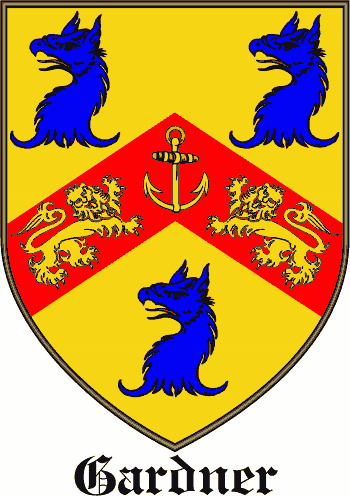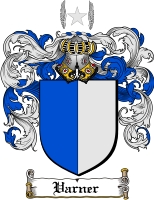An
old Cherokee told his grandson, "My son, there is a battle between two
wolves inside us all. One is Evil. It is anger, jealousy, greed,
resentment , inferiority, lies, & ego. The other is Good. "It is
joy, peace, love, hope, humility, kindness, empathy, & truth."
The boy thought about it, and asked, "Grandfather, which wolf wins?"
The old man quietly replied, "The one you feed."
Gardner is a surname. Some sources claim that it is an occupational surname that comes from the word "gardener."[1]
Other sources claim that it is derived from the Saxon words gar,
meaning "a weapon", and dyn' meaning "sound or alarm", combined with the
termination "er." Early variants included Gardyner, Gardener, Gardenar, Gardinier, Gardiner, and Gardner; the last two are the most common today.[


This originally Norman surname of VARNER
was derived from a Germanic personal name composed of the elements WARIN
(guard) and HERI (meaning army). The name has two distinct origins, it
was a baptismal name 'the son of Warrener' and an occupational name
meaning the keeper of the 'warren' a place privileged for the keeping of
conies, hares, partridges and pheasants. The name is also spelt WERTZ,
WORLIN, WESSELMAN, WERNJTES and WESSELING, to name but a few. Surnames
which were derived from ancient Germanic personal names have the same
meaning in many languages. The court of Charlemagne (Charles the Great,
king of the Franks (742-814) was Christian and Latin speaking), the
vernacular was the Frankish dialect of Old High German, and the personal
names in use were Germanic and vernacular. These names were adopted in
many parts of northwest Europe, particularly among the noble ruling
classes. Hereditary surnames were found in Germany in the second half of
the 12th century - a little later than in England and France. It was
about the 16th century that they became stabilized. Notables of the name
include Horst WESSEL (1907-30) the German national socialist, born in
Bielefeld. He was the composer of the Nazi anthem 'Die Fahne Hoch' known
as the Horst WESSEL song. Tom WESSELMAN, born in 1931 is the American
painter, born in Cincinnati, Ohio. He studied psychology at Cincinnati
University before taking art courses. He moved to New York in 1961,
abandoning the Abstract Expressionist style and turning instead to Pop
Art. His work includes the series known as 'The Great American Nude'.
Because of the close relationship between the English and German
languages, some Germans are able to transform their names to the English
form just by dropping a single letter. Many Germans have re-spelt their
names in America. A great number of immigrants from Germany settled in
Pennsylvania. After the start of the first World War, Germans in great
numbers Anglicized their names in an effort to remove all doubt as to
their patriotism. Afterwards some changed back, and then during World
War II the problem became acute once more, and the changing started all
over again, although not with as much intensity.
